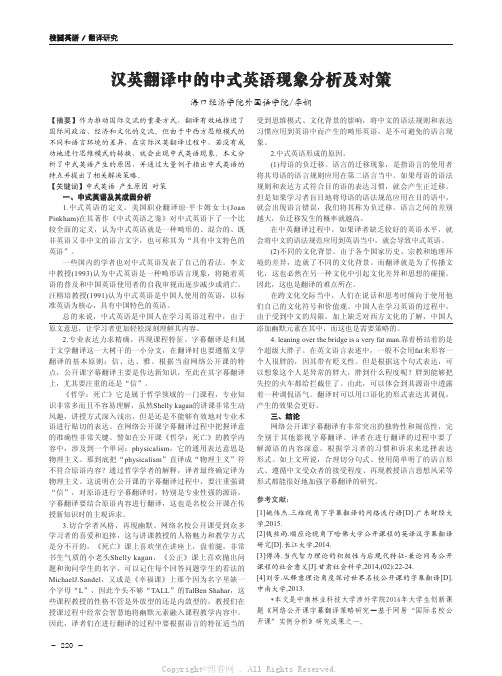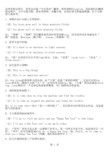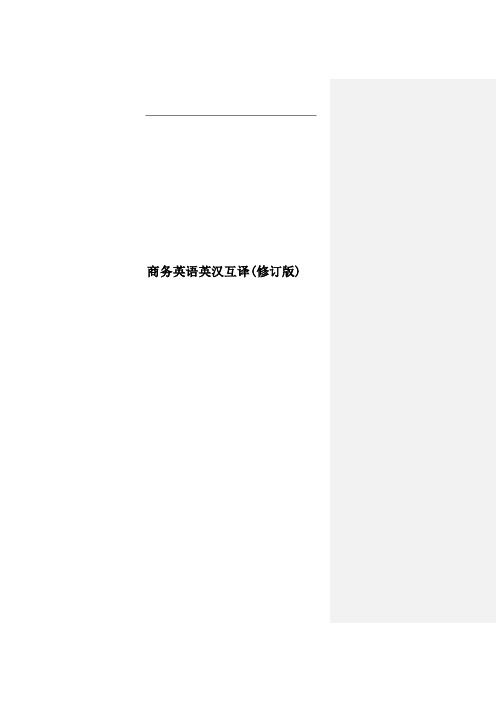91--商务英语翻译期chapter_18_汉英翻译中的中式英语
浅析汉译英中的中式英语现象

浅析汉译英中的中式英语现象作者:殷碧雯来源:《青年时代》2016年第18期摘要:本文对中国影视剧名的搞笑翻译中的中式英语现象进行了分析。
随着英语在中国的广泛传播,中式英语的问题越来越突出,这样必然影响着国人和外国人之间的沟通和交流。
互联网上存在着一些中国影视剧剧名的恶搞翻译,根据这个现象,这篇论文主要致力分析这些影视剧剧名的汉译英翻译中的中式英语现象,以此让人们更好的了解什么是中式英语,作者希望能以此改善翻译质量帮助人们对英语有更好的认识并能在以后的翻译活动中更好的避免中式英语这一错误。
关键词:中式英语;中国影视剧;汉译英剧名;一、中式英语中式英语是在英语学习过程中受母语的影响出现的一种错误的不规范的英语(李文中,1993)。
中式英语在英语界被称之为“Chinglish”,它带有明显的中文语音、语法、词汇特点,同时又是汉语和英语的混合成,但是它“既不是英文又不是中文”(Pinkham,2000)。
因此,尽管中式英语是由中国人发明并受中国文化的影响,但是中式英语是一种不符合规范英语,不符合英语文化习惯的畸形语言,是不符合地道的英语表达习惯或语法规则,受母语影响较为深刻的一种语言。
中式英语很难被英语国家的人所理解和接受。
二、中式英语的成因及表现中式英语是中国的英语学习者在用用于进行交际时候,受母语语音、结构、语义或文化干扰和影响而出现的失误。
中式英语有很多表现形式,接下来,作者将以中国影视剧的剧名的搞笑翻译为例,分析其中的中式英语的现象。
(1)硬译(rigid translation)硬译就是按照原文逐字逐句地直译。
在翻译的过程中,人们将看见的中文一个个翻译成相对应的英文,他们没有意识到即使句子的语法是对的,但是表达的意思却可能是错的,这样的表达并不能被英语国家的人所接受。
Egl:刘三姐A Third sister LiuB Liu sanjie(The Third Sister of the Liu Family)刘三姐,是民间传说的壮族人物,古代民间的传说歌手。
商务英语阅读教程2——英译汉

商务英语阅读教程2——英译汉Business English Reading Tutorial 2 - English to Chinese TranslationOriginal English Text:Translation in Chinese:工作场所的有效沟通有效沟通对任何商业组织的成功至关重要。
它在促进积极的工作环境、增强团队合作和提高总体生产力方面起到了关键作用。
在今天快节奏的商业世界中,有效沟通技巧比以往任何时候都更重要。
有效沟通的关键之一是清晰。
必须清晰准确传达信息,以确保没有误解的空间。
这可以通过使用简单明了的语言,避免可能会让听众困惑的行话或技术术语来实现。
重要的是要意识到接收者的理解水平,并相应地调整沟通方式。
除了清晰度外,积极倾听是有效沟通的另一个关键要素。
聆听他人的想法和关切有助于建立信任和融洽关系。
它还可以提供更好的问题解决和决策能力。
积极倾听包括全神贯注地听讲者说话,保持眼神交流,并提供反馈或提问以显示兴趣和理解。
有效沟通还涉及非语言暗示,如肢体语言、面部表情和语调。
这些非言语暗示可以传递情感、意图和态度,而仅凭文字可能无法表达。
了解自己的非语言沟通并能够阅读和解释他人的非语言暗示可以极大地增强沟通效果。
在技术时代,电子沟通已成为工作场所沟通的重要组成部分。
虽然电子邮件、即时消息和视频会议提供了便利和效率,但它们不能取代面对面的互动。
在虚拟和面对面沟通之间保持平衡是确保信息有效和有意义交流的关键。
最后,反馈对于有效沟通至关重要。
建设性的反馈帮助个人了解自己的长处和弱点,使其能够提高自己的沟通技巧。
反馈应具体、及时和可操作,才能发挥作用。
它应该关注行为或行动,并避免个人批评。
总之,有效沟通对任何商业组织的成功至关重要。
它涉及到清晰度、积极倾听、非语言暗示、电子和面对面沟通的平衡以及建设性反馈。
通过发展和实践这些技能,个人可以成为更有效的沟通者,并为积极和富有成效的工作环境做出贡献。
浅析汉英翻译中的中式英语

浅析汉英翻译中的中式英语作者:戴素敏来源:《成才之路》2011年第23期摘要:在英语教学过程中,经常会出现学生不能准确、地道地表达自己的思想,会说出许多中式英语(Chinglish)。
中式英语是中国英语学习者受到母语的负迁移影响,在语言交际中出现的不符合规范英语或英语文化的“特殊”英语。
本文分析了中式英语产生的原因及在汉英翻译中的表现和解决的策略。
关键词:中式英语;汉英翻译中式英语形成于18世纪的洋泾浜语(Pidgin),是当时的广州中国人同英国商人进行贸易时使用的工作语言。
词汇以英语为主,夹杂着广东话、葡萄牙语、马来语及印地语的字眼,语法结构主要为广东话。
体现的是中国人习得英语的最初级、最表面的阶段。
从它的历史成因上我们可以把中式英语简单理解为汉语语法与英语词汇的结合。
它指在汉语思维和汉语模式的影响下完全根据汉语字面意思来表达的英语形式,是英汉翻译中的一种不规范的表现,带有明显的汉语痕迹。
因此,我们在英汉翻译中要克服中式英语的出现,无论在口语或书面语中都要正确地表达出原文的含义和语言特点。
一、中式英语产生的原因1. 母语的负迁移迁移指在学习新知识时,学习者以前所掌握的知识、经验对新知识学习的影响。
学习者在学习第二语言时,会受到母语的迁移作用。
迁移又可以分为正迁移和负迁移。
正迁移指母语与目的语相似,能够促进目的语的学习。
例如,“我去上学”。
“I go to school.”母语与目的语的结构相似,学习者能够较好地掌握这一句型。
相反,如果目的语和母语存在差异,学习者在目的语的学习中就会盲目套用母语的表达习惯或模式,因此出现错误,这就是负迁移。
比如,英语中有存在句型,“there be”句型。
但学习者在实践翻译中,经常会忘记这个句型,会用实意动词来取代。
英汉属于不同的语系,因此存在着更多的差异,中国学习者在学习英语时的负迁移就会大于正迁移。
尤其是在英语学习初级阶段,由于掌握的知识还不够熟练,更容易受到母语的负迁移影响,出现中式英语就成为必然的一个过程。
汉英翻译中的中式英语现象分析及对策

- 220-校园英语 / 翻译研究原文意思,让学习者更加轻松深刻理解其内容。
2.专业表达力求精确,再现课程特征。
字幕翻译是归属于文学翻译这一大树干的一小分支,在翻译时也要遵循文学翻译的基本原则:信、达、雅。
根据当前网络公开课的特点,公开课字幕翻译主要是传达新知识,至此在其字幕翻译上,尤其要注重的还是“信”。
《哲学:死亡》它是属于哲学领域的一门课程,专业知识非常多而且不容易理解,虽然Shelly kagan 的讲课非常生动风趣,讲授方式深入浅出,但是还是不能够有效地对专业术语进行贴切的表达。
在网络公开课字幕翻译过程中把握译意的准确性非常关键。
譬如在公开课《哲学:死亡》的教学内容中,涉及到一个单词:physicalism ,它的通用表达意思是物理主义。
那到底把“physicalism ”直译成“物理主义”符不符合原语内容?通过哲学学者的解释,译者最终确定译为物理主义。
这说明在公开课的字幕翻译过程中,要注重强调“信”,对原语进行字幕翻译时,特别是专业性强的源语,字幕翻译要结合原语内容进行翻译,这也是名校公开课在传授新知识时的主观诉求。
3.切合学者风格,再现幽默。
网络名校公开课受到众多学习者的喜爱和追捧,这与讲课教授的人格魅力和教学方式是分不开的。
《死亡》课上喜欢坐在讲座上,盘着腿,非常书生气质的小老头Shelly kagan ,《公正》课上喜欢抛出问题和询问学生的名字,可以记住每个回答问题学生的看法的 MichaelJ.Sandel ,又或是《幸福课》上那个因为名字里缺一个字母“L ”,因此个头不够“TALL ”的TalBen Shahar ,这些课程教授的性格不管是外放型的还是内敛型的,教授们在授课过程中经常会智慧地将幽默元素融入课程教学内容中。
因此,译者们在进行翻译的过程中要根据语言的特征适当的添加幽默元素在其中,而这也是需要策略的。
4. leaning over the bridge is a very fat man.靠着桥站着的是个超级大胖子。
翻译中的中式英语之鉴

6. 近几年我国的第三产业增长很快。
〔误〕For the latest couple of years the third industry in our country has been developing very fast.
〔正〕For the latest couple of years the tertiary industry in our country has been developing very fast.
〔正〕Tea grows well in these mountain fields.
注:“茶树”、“果树”等在翻译成英语时常常省略tree,因为这些词本身就包含“树”的意思。如orange(橘子树),banana(香蕉树)等。
2. 淡季生意不好做。
〔误〕It's hard to do business in light seasons.
〔正〕It's hard to do business in slack seasons.
注:“淡”在英语中往往不用light表示。又如:“淡茶”(weak tea),“淡水”(fresh wateBiblioteka )。 3. 这可是件大事啊!
〔误〕This is a big thing!
〔正〕This is an important matter!
注:big thing是指体积大的东西,而“大事”是指“重要的事情”,它也可以用big issue来表达。随意中文的“大”不一定对应英文的big。如:“大雾”的表达就是thick fog。large则表示一个无体总的宽度和数量,有广阔和众多的意思。
4. 该停机检查故障了。
〔误〕It is time that we stop the machine and find the trouble.
商务英语英汉互译(修订版)

occupationalculture
职业文化
pragmaticview实用观点
holisticview整体观点
generalterms一般条款
generalpractice一般惯
例
verbaloffer口头报价
salesconfirmation销售
确认
unconditionalassent无
伴
sizeoftheorders订货
规模
luxuryitems高档商品
priceelastic价格弹性
生产日程
促销活动sales
promotionactivity
产品开发product
development
销售人员marketing
personnel
市场营销marketing
销售调研marketing
价格及金银
price-species
economicandfinancial
transactions经济与金融
交易
doubleentry
bookkeeping复式簿记
creditanddebit贷方和
借方
surplusordeficit盈余
与赤字
errorsandomissions错
漏
equityinterests股本息
条件同意
elaboratestipulation
详细规定
timeofvalidity有效期
接受报价acceptance
商务谈判business
negotiation
可撤销的revocable
书面发盘writtenoffer
发盘驳回offerrejected
论英汉翻译中的中式英语.26
汉英翻译中的中式英语及其改善措施摘要:随着我国改革开放和全球经济一体化,我国与其他国家之间的交流与沟通越来越频繁。
英语已经发展为一门世界性语言,并且成为我国对外交流的主要工具;而翻译便成为必要的交流形式。
然而,在翻译过程中普遍存在“中式英语”的现象。
译者拘泥于原文字面,“对号入座”,使得译文生硬晦涩,不符合英语的习惯表达,并带有明显的汉语特征,因而不能被以英语为母语者所接受。
它的存在严重影响了翻译的质量以及我国的对外交流。
针对这一问题,本文对中式英语进行了较系统的研究,旨在给中国英语学习者一个借鉴,在翻译过程中尽量减少使用中式英语,提高汉英翻译的质量。
本文共分为五大部分,从三个方面对中式英语进行论述。
第一个方面从中式英语的定义入手,对中式英语进行了一个简单介绍,并分析了它的六种错误类型,通过大量例子,较详细的描述了汉英翻译中的中式英语的表现形式;第二个方面则利用对比分析指出其产生的根本原因,即中西思维模式的差异以及母语的干扰;第三个方面针对中式英语的产生原因及表现形式,提出了五大改善措施,以减少和避免汉英翻译中中式英语的现象。
关键词:中式英语;思维模式差异;母语的干扰Chinglish in Chinese-English Translation and Possible SolutionsAbstract: With China‟s reform and opening-up policy and economic globalization, Chinese people are communicating with foreign countries in every aspect. English has developed as a widely used language to fulfill international communication, and translation has become a necessary method. However, a phenomenon exists commonly in Chinese- English translation, that is, Chinglish. The translators just rigidly stick to original words, and their translations turn out to be obscure and not consistent with English habits or rules but with Chinese characteristics, which cannot be accepted by English native speakers. Consequently, Chinglish seriously affects the translation quality and our communication with the world, and the international status of our country.This paper is an attempt to study Chinglish in Chinese-English translation. It consists of three parts. Part one describes Chinglish with interlanguage and analyzes the basic causes of Chinglish that are thought pattern difference between Chinese and English and interference of mother tongue. From the aspects of six sorts of errors, part two demonstrates main manifestations of Chinglish in C-E translation with a large number of examples. Part three offers some possible solutions with an aim to reduce or evade Chinglish in Chinese-English translation to the largest extent.Key words: Chinglish; thought pattern difference; mother tongue interferenceTable of ContentsI. Introduction (1)II. Chinglish (1)A. Definition of Chinglish (1)B. Manifestations of Chinglish in Chinese-English Translation (2)1. Unnecessary Words (2)2. Rigid Translation (4)3. Misuse of Words (4)4. Incorrect Word Order (6)5. Incorrect Subject (7)6. Incorrect Negation (8)III. Basic Causes of Chinglish (9)A. Thought Patterns Differences (9)B. Mother Tongue Interference (11)IV. Possible Solutions to Chinglish in Chinese-English Translation (12)A. Knowing More about English Thought Patterns (12)B. Accumulating Chinglish Examples (13)C. Doing More Translation Practice (14)D. Adapting good ways in using dictionaries (14)E. Watching more English movies and TV drama programs (15)V. Conclusion (15)I. IntroductionSince English has developed as an international language, study on various English versions on the linguistics, culture and cognition has become an important subject in the international language study field.Scholars home and abroad have been devoting themselves to studying Chinglish for years. Li Wenzhong distinguished Chinglish from Chinese English. He thought that Chinese English was not a hypothesis but an objective phenomenon with expansive prospect and study value, while Chinese English was distorted English and would be gradually reduced or eliminated along with the wide use of English and Chinese English learners‟. On the basis of interlanguage, both Chinese English and Chinglish were interlanguage variations produced by Chinese and affected by Chinese culture, and they were inevitable. There are two causes of Chinglish. First, the misunderstanding of the original and for the second was being not familiar with English characteristics and adopting Chinese collocations and structures. Joan Pinkham, an American professional translator, systematically classified Chinglish manifestations and corrected them with specific analysis.The author of this paper agrees that Chinglish is objective and unavoidable for Chinese English learners but needs improvement. This paper studies Chinglish in Chinese-English translation, discussing its definition, causes and solutions with a large number of examples.II. ChinglishChinglish has existed for a long history, even since Chinese began to study and use English. In the early 1980s, some foreign experts pointed out that some phrases or structures in some published Chinese magazines and newspapers did not conform to Standard English actually. Because it manifests Chinese feature, they called this kind of English “Chinglish” (Ma Xuehong 79).A. Definition of ChinglishChinglish is defined by Joan Pinkham who is an American language expert in her book The Translator’s Guide to Chinglish: “Chinglish, of course, is that misshapen, neither English nor Chinese but that might be described as …English with Chinese characteristics”. It does not conform to Standard English and cannot be understood or accepted by English native speakers, so it is playing a negative role in communicating with English people.In the strict sense, Chinglish is the interlanguage of Chinese learners between Chinese and English. Two of the characteristics of interlanguage are cited: (Pinkham 32) (1)It is dynamic, and full of errors, and is in the process of constant change towards astandard target language system.(2)The learner‟s competence is transitional. It is subject to constant revision, passes through a number of stages, and forms the “interlanguage continuum”.Another feature is fossilization which is defined as a process occurring from time to time in which incorrect linguistic features become a permanent part of the way a person speaks or writes a language.Being Chinese, we generally cannot reach the same level of competence as English natives. Our “final state”grammar is not standard English grammar. Thus, certain rules and items “fossilize”. Typical errors are “he have…”and “she go to school yesterday”, etc.According to the definitions of Chinglish and interlanguage and the characteristics of interlanguage,a conclusion can be drawn that Chinglish is an interlanguage of Chinese learners of English, and is neither Chinese nor English but stands between them.B. Manifestations of Chinglish in Chinese-English TranslationIt has been discussed in chapter one that thought is the basis of language, so the thought pattern difference will affect the transformation of the languages. Translation is a language activity that reexpresses the thought of language by another language accurately and entirely. In this sense, translation should not be merely viewed as the transformation of languages, but also the transformation of thought patterns. Besides, the structure difference between the two languages will also affect the translation. When translating, many Chinese English learners only pay attention to the language replacement, neglecting the differences of thought patterns and structures. Consequently, Chinglish appears. For a clearer cognition of this phenomenon, this chapter classifies it to six sorts of errors that are rigid translation, unnecessary words, and misuse of words, incorrect word order, incorrect subject and incorrect negation.1. Unnecessary WordsA sentence should contain no unnecessary words, a paragraph no unnecessary sentence. It is said that any words which perform no function in the sentence—that is, which add nothing to the meaning—should be edited out.However, almost every text translated from Chinese into English contains unnecessary words. Namely, unnecessary words appear in a large number of phrases and sentences. Unnecessary words are thehallmark of Chinglish. Let‟s see the following examples.(1) 确保中美两国之间紧密的合作关系。
汉英翻译中的中式英语
汉英翻译中的中式英语作者:李旭来源:《科教导刊·电子版》2014年第19期摘要在汉英翻译中,“中式英语”是一种普遍存在的现象。
中式英语是中国英语学习者在汉英文化、思维不同和母语负迁移的干扰下形成的,译者盲目套用汉语思维来进行汉英翻译。
本文注重分析中式英语的成因、表现形式和如何有效地避免“中式英语”。
关键词中式英语产生原因表现形式避免方法翻译是运用一种语言把另一种语言所表达的思维内容准确而整体地重新表达出来的语言活动。
(冯庆华,2009:6)随着历史的不断发展,翻译逐渐担负起了促进世界各族人民相互对话、相互交流、相互理解、共同发展的重任。
进入21世纪后,翻译的积极作用在各个方面都得到了凸显。
一方面,全球化使得中国进一步加强了与世界其他国家和民族的交往。
另一方面,中国的改革开放,使得中国这片土地更广泛地被世界所认识。
无论是文化的输出还是输入,都离不开翻译这一重要的桥梁与纽带。
正是在文化不断的交流下,越来越多的中国人开始学习英语,但是在学习英语的过程中逐渐出现一种特殊的语言形式,这就是我们所说的“中式英语”。
本文着重探讨在汉英翻译中产生中式英语的原因和几种重要的表现形式以及解决办法。
1“中式英语”及产生的原因美国学者琼·平卡姆(Joan Pinkham)在其著作《中式英语之鉴》中,把“中式英语”定义为:“Chinglish, of course, is that misshapen hybrid language that is neither English nor Chinese but that might be described as English with Chinese characteristi cs.”(所谓中式英语就是那种畸形的、混合的、既非英语又非汉语的语言文字,也可称其为“具有汉语特色的英语”。
)(2000:1)。
1.1文化上的差异汉语与英语分别创于不同的地域,在其各自的发展中,分别形成了不同的文化。
浅析汉英翻译中的中式英语
当做生活 与学 习的需要 ,当做生命成长的需要 ,是实实在在 的 “ 我要写” 是由 自己决定表达什 么 , , 怎么表达。 立足于“ 应需” 教 ,
前 面我们 已经说过 , 陶认 为教材 的功能就是 “ 叶圣 凭借”要 师须在命题上多下些工夫 , , 并形成一定 的体 系, 作文教学课 完善 真正实现其 “ 凭借” 的作用 , 使学生能够借之实现学习迁移 , 就必 程建设 。在平时的作文训练 中( 当然也希望在所有考试 中) 题 命
过去教材中相对偏难 的枯燥 的文言学 习材料 ,在强调夯实文言 语 文教育传统 , 又吸收了西方教育的积极 因素 ; 中了他在教 既集
基础知识 的同时 , 更是注重学生对文学 、 文化的敏感和兴趣 。
育实践中的切身经验 , 又渗透了他在 文学方面 的深厚涵养 。 它代
表着 当代 中国教材编辑思想 的高峰 ,对于新课程改革中的校本
的语 文活动给语文学 习带来 了活力 , 也丰 富了学生的 日常生活。 2 适合学生的文学阅读课程建设 .
自情感 上的需求和 意志上 的 目的。是主动 自觉地写 ,是 自由的
写, 不仅仅是题材 、 体裁 的 自由, 更是精神 、 心灵的 自由。是 自己
模拟 法庭 等活动, 训练学生的表 达能力 、 思辨能力。 可以说 , 丰富 需要 写作 , 把作文 当做 自身倾 吐 的需要 , 当做表 达思想 的需要 ,
强为授予 , 即使教者心赏某 文, 索有素 , 玩 亦不 可选 为教材 。” 这 发展 的新变化 、 新特点 , 同时可以通过 多拟一些与社会热 点相 关
里 的文学阅读 澡程分为现代 文阅读 和文言文阅读 。在现代文 阅 的作文题来促 使学生深入思考社会 问题 。此外还应该贴近学 生 读校本课程建设 』 .我们主要选 取了适合学生身心成长并 和教 生活 , - 让他们有话可说 , 有事 可写 , 有感可发 , 就能激发他们表达
商务英语-汉译英
商务英语汉译英(一)根据英语的表达习惯确定词义1、向.......提出索赔lodge a claim against2、既得利益vested interests3、公司上下将齐心协力,努力使公司发展成具有国际竞争力的高科技企业集团。
The management together with the rank and file of our company is determined to make consorted efforts to foster the business to grow into a high-tech focused conglomerate with a competitive edge on the international market.4、本公司本着平等互利、互通有无的原则,积极开展与世界各地老客户的业务往来,并竭诚为各位朋友提供优质服务。
We hold to the tenet of equality ,mutual benefit and mutual complement in developing business connections with old and new customers in the world and shall make every effort to give the best services to our customers.5、本公司还承办商品及原材料的来样、来样加工,补偿贸易,合作生产,合资经营等业务。
The business scope of our corporation also covers/includes customer-oriented processing with supplied materials and samples, compensation trade, co-operation in manufacturing and the partnering of joint ventures with external businesses.6、同时,我国政府已同瑞典、罗马尼亚、德国、丹麦、荷兰签订了相互促进和保护投资协定,同加拿大、美国、法国、比利时-卢森堡经济联盟、芬兰、挪威、泰国、意大利、奥地利签订了投资保护协定,还同日本、美国、法国、德国、英国、比利时等国签订了双重征税协定。
- 1、下载文档前请自行甄别文档内容的完整性,平台不提供额外的编辑、内容补充、找答案等附加服务。
- 2、"仅部分预览"的文档,不可在线预览部分如存在完整性等问题,可反馈申请退款(可完整预览的文档不适用该条件!)。
- 3、如文档侵犯您的权益,请联系客服反馈,我们会尽快为您处理(人工客服工作时间:9:00-18:30)。
English College
1. 词汇
6. Incorrect Negation 油漆未干! A:﹡The paint is not dry! B: The wet paint! 非公莫入! A:﹡Don’t come in without business! B: For business only. 我觉得这不是一个好主意。 A:﹡I think it is not a good idea. B: I do not think it is a good idea.
Firstly, we can read a larger number of English books written by the native speakers, watch more English movies without dubbing, and listen to English radio more frequently. Secondly, we can communicate with foreigners more. Thirdly, we should use English-English dictionary as much as possible.
Friday, March 07, 2014ຫໍສະໝຸດ English College
3. Misuse of Words 这个价格太贵了。 A:﹡The price is too expensive. B: The price is too high. 白开水 A:﹡white boiled water B: plain boiled water 这份牛排很好吃。 A:﹡The beefsteak is delicious. B: The beefsteak is tasty.
English College
Friday, March 07, 2014
4. Incorrect Word Order 飞机从北京起飞。 A:﹡The plane from Beijing take off. B: The plane takes off from Beijing. 上周,我和我的朋友们一起去了上海。 A:﹡Last week, I and my friends went to Shan ghai together. B: Last week, I went to Shanghai with my frie nds.
Friday, March 07, 2014
English College
Manifestations of Chinglish in Chinese-English Translation
Friday, March 07, 2014
English College
Manifestations of Chinglish in Chinese-English Translation
Friday, March 07, 2014
English College
5. Incorrect Subject 学好英语,大量的练习是必要的。 A:﹡To learn English well, a great deal of prac tice is necessary. B: To learn English well, one needs to have a great deal of practice. 中国发生了巨大的变化。 A:﹡China has taken place great changes. B: Great changes have taken place in China.
Friday, March 07, 2014
English College
我今晚将和陈先生、黄太太一起用餐。 A:﹡I, Mr. Chen and Mrs. Huang are going to h ave dinner together this evening. B: Mr. Chen, Mrs. Huang and I are going to ha ve dinner together this evening.
Chinese-English Translation For International Business
Friday, March 07, 2014
Chapter 18 汉英翻译中的中式英语
Chinglish in Chinese-English Translation
Friday, March 07, 2014
Friday, March 07, 2014
English College
Definition of Chinglish
Friday, March 07, 2014
English College
Definition of Chinglish
Chinglish is misshapen, hybrid language that is neither English nor Chinese but that might be described as English with Chinese characteristics by Joan Pinkham who is an American language expert
Friday, March 07, 2014
English College
(3)多用套语
确保中美两国之间紧密的合作关系 A:﹡to ensure a relationship of close cooperation between China and America B: to ensure close cooperation between China and America
Friday, March 07, 2014
English College
(5) Difference of orders of direction and time western people are accustomed to “north or south first”, but Chinese people follow “east or west first”. “西北”and “东南” are “northwest” and “southeast” in English. It is the same for time order. For example: 3) 前事不忘, 后事之师。 Past experience, if not forgotten, is a guide for the future. 4) 前不见古人, 后不见来者。 Looking back, I do not see the ancients.
(1) Difference of emphasis on individual or general Eg. In the English name “Tom Smith” “Tom” is the given name and “Smith” is the family name. in the Chinese name, the family name is before the given name. For instance, 张小华
English College
Friday, March 07, 2014
Possible Solutions to Chinglish in Chinese-English Translation
Friday, March 07, 2014
English College
1. Knowing More about English Thought Patterns
•
(2) Difference of emphasis on subject or object. eg. 我突然想到一个好主意。 English: A good idea suddenly came to me.
English College
Friday, March 07, 2014
(3) Difference of thinking angles Most of Chinese people may translate 您先请 into “You first please”, but the idiomatic expression should be “After you”. (4) Difference of emphasis on process or result. Eg. 经过四个小时的努力,我终于爬上了山顶. I reached the top of the mountain after four hours’ efforts.
Friday, March 07, 2014
English College
Basic Causes of Chinglish
Friday, March 07, 2014
English College
Basic causes of Chinglish
•
1. Thought Patterns Differences
Friday, March 07, 2014
English College
2. Accumulating Chinglish Examples There are lots of ways to get the examples. In our daily translations, there may be many Chinglish; on the Internet, numerous examples are listed; in some books, there are also many Chinglish examples with detailed analysis. 3. Doing More Translation Practice Only through practice can we make mistakes, correct them, and not make the same mistakes next time. In this way, we can reduce Chinglish gradually.
